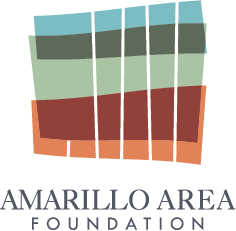
Amarillo Area Foundation is proud to share the recipients for the second cycle of the 2024 Discretionary Grants. This grant cycle included proposals in all three of our focus areas—Education, Health, and Economic Opportunity. This cycle also has two unique and urgent grantees. These organizations are continuing the important work that is our mission: improving the quality of life for Texas Panhandle residents. Over $2,199,406 was granted in this cycle. Thank you to these organizations!

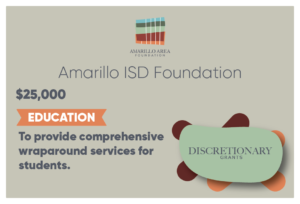
Amarillo ISD’s Families in Transition program works to serve the homeless, housing insecure, and unaccompanied minors of the Amarillo school district. The wraparound services they provide to the most vulnerable population of students in Amarillo ensures that these students are able to have their basic needs met while attending school, thus preventing students from dropping out and increasing the chances that they will persist through high school and on to postsecondary.
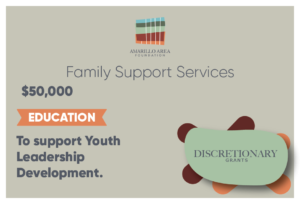
Family Support Services Community Education program will hire an individual with lived experience as an Opportunity Youth (individuals aged 16-24 who are not meaningfully engaged in education or the workforce). This position will receive specialized training to work with the OY population and, building upon the work FSS already does in youth mentorship and education, will create a project specifically focused on OY with the ultimate goal of working upstream to prevent at-risk youth from experiencing disconnection.
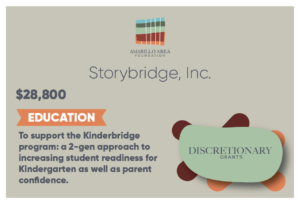
Storybridge has created an innovative program seeking to increase early childhood literacy that goes beyond putting books in children’s hands. Kinderbridge is an in-depth relationship based two-gen approach to building early childhood literacy and Kindergarten readiness. Funding will provide general operating support for this growing early childhood literacy program offered free to families.
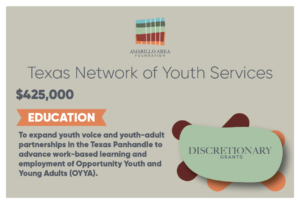
Texas Network of Youth Services is a statewide organization providing technical support and capacity building for youth-serving organizations as well as policy creation and advocacy at the State level. All their work is informed and led by young people with lived experience as Opportunity Youth (individuals aged 16-24 who are not meaningfully connected to education or the workforce). 1 in 10 OY in the country are Texan. While the number of disconnected individuals is higher in urban areas, the rates of disconnection are significantly higher in rural communities. The Texas Panhandle is estimated to be home to roughly 6,000 OY. Over the course of this 3-year grant period, TNOYS will work with local stakeholders as well as local youth and young adults to build policy recommendations for the upcoming State Legislature focused on the education and workforce needs of youth and young adults in the Texas Panhandle. Additionally, TNOYS will work with Panhandle youth to have representation on the Texas Emerging Leaders Board which provides professional development, monetary compensation, networking opportunities, and the opportunity to lead work at the State level which impacts young people in this area. TNOYS staff will also work with local service providers, educators, and employers to provide technical assistance and capacity building for those who work with Panhandle OY to build better youth-adult partnerships with the end goal being stronger education/workforce alignment and more accessible career pathways in our area.


Early Matters Texas highlights the shared influence and responsibility that childcare providers and businesses have in addressing early childcare gaps in the Texas Panhandle. Through local and statewide systemic work, Early Matters Texas will facilitate business and early childcare leaders to address missing childcare accessibility gaps affecting the recruitment and retention of talent to industries in the Texas Panhandle. Through collaborative data collection and convening, Early Matters Texas has built a supportive network that spreads the importance of early childcare education as an economic motivator.
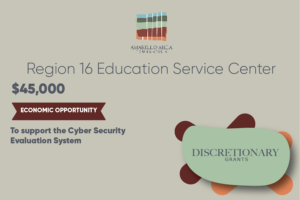
Region 16 is dedicated to providing cybersecurity programs for schools, nonprofits, and small businesses in the Texas Panhandle. They aim to protect the private information of students and seek to safeguard rural nonprofits and small businesses that do not have adequate cybersecurity needed to protect private and sensitive information. Through digital security services, Region 16 seeks to protect family and student data while providing opportunities for safe digital resources and education in the Texas Panhandle.

The Community Day Care Center is meeting needs vital to Pampa and its surrounding areas by increasing access to high-quality childcare. The center utilizes teacher strategies that help children transition from early childcare to school-ready levels that set children up for long-term success in the school system. The center will increase childcare services, develop an evidence-based classroom space, and expand an outdoor learning area
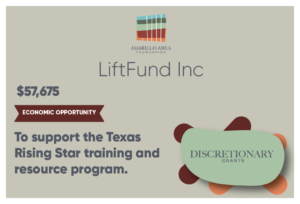
LiftFund is committed to providing training for underdeveloped childcare facilities in the TX Panhandle. Their technical training provides opportunities for childcare business growth, Texas Rising Star certification, and best practices beyond State quality, safety, and educational improvements. LiftFund is committed to expanding quality childcare in rural areas while developing sustainable business practices for childcare providers.
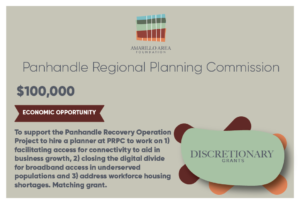
The PRPC is facilitating broadband connectivity that aids business and housing growth in the Texas Panhandle. The PRPC and its partners are dedicated to recognizing economic gaps and providing plans that address economic growth in rural communities through digital equity. The PRPC is committed to educating communities about the value of digital accessibility, increasing digital accessibility, and providing competitive broadband costs in rural areas that will expand digital access and community resources


After Covid 19, bonus government funding was given to organizations like DCSC to assist with their food costs, but that assistance is no longer available. The grant from AAF will be used to cover the rising cost of food and for travel expenses for their meal delivery program, ensuring food service continuity. DCSC assists 115 remote clients and 35-60 congregate meal clients Monday through Friday each week. Grant monies will be spent first on groceries, which represent 50% of their total budget, and secondly on delivery expenses, representing 3% of their budget.
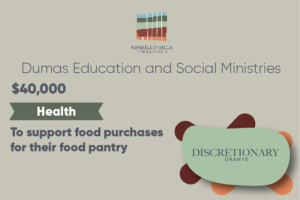
Using the client’s choice shopping model, DESM clients check in at the front desk and then visit with their friends while waiting their turn to shop. Each week, there are around 60 seniors who visit the pantry on Wednesdays, as well as about 300 families on Thursdays. The clients of DESM come from all over Moore County including Sunray and Cactus. With a meat packing plant nearby, there is usually a rotating group of newly hired employees visiting the DESM food pantry who have come from Haiti, Sudan, Burma, Cuba, Guatemala, and other places. After about 1 and a half months, these food pantry clients have been able to make a living wage through their employment and drop their pantry visits. Many other clients, however, are physically or mentally disabled or are from single-parent families and need extra food support. DESM serves its community very affordably, receives broad community support, and yet food costs continue to rise. The AAF grant will help DESM continue to feed Moore County residents by purchasing foods that are either unavailable through the local Food Bank or are more expensive to purchase elsewhere.

In the Texas Panhandle, Swisher County with a population around 7,000 has one of the highest rates of food insecurity. Joseph’s Storehouse, located in Tulia, Texas, was born out of a desire to provide a food pantry and to give back to the Tulia community where the Executive Director was raised. The food pantry is open to Swisher County residents on the 2nd and 4th Thursdays each month, and they also offer food surplus distributions on Fridays. Joseph’s Storehouse intends to feed and reach clients with another 9,300 individual encounters, including 3,200 families, in 2025. This past year, senior citizens alone received around 3,000 client service encounters with the food pantry. Unfortunately, the pantry suffered water damage over the years and now needs repair. With the AAF grant award, the completed renovation of the food pantry would ensure safety for the clients and prevent further water damage. More importantly, a renovated food pantry would allow continuous food distribution in Tulia for these seniors and other clients facing food insecurity, as well as a safer drop-off point for the trucks who deliver surplus food.
 The grant award will allow this pantry to replace the patch-repaired freezer, make facility repairs, and purchase nutritious proteins to feed their clients. Founded in 2007, this is the only food pantry in the area that serves the communities of White Deer and Skellytown. Recent reports show the population of White Deer as 1,021 and the population of Skellytown as 389. During July 2024, WDSLFP served 18.8% of their community’s population, and they served an average of 83 families per month in the months of May, June, and July of 2024. Operated entirely by volunteers, White Deer-Skellytown Lighthouse Food Pantry has 12 regular volunteers and 7 board members who help organize, fundraise, and distribute food.
The grant award will allow this pantry to replace the patch-repaired freezer, make facility repairs, and purchase nutritious proteins to feed their clients. Founded in 2007, this is the only food pantry in the area that serves the communities of White Deer and Skellytown. Recent reports show the population of White Deer as 1,021 and the population of Skellytown as 389. During July 2024, WDSLFP served 18.8% of their community’s population, and they served an average of 83 families per month in the months of May, June, and July of 2024. Operated entirely by volunteers, White Deer-Skellytown Lighthouse Food Pantry has 12 regular volunteers and 7 board members who help organize, fundraise, and distribute food.
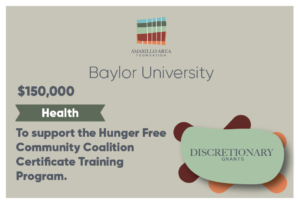
This initiative is a two-year Hunger Free Community Accelerator training program to establish and sustain the Texas Panhandle Hunger Free Community Coalition. This four-module training in year one allows for 15-20 diverse community partners within the Potter/Randall area to be the first cohort in this certified training, followed by year two of technical support from the Collaborative’s experts to solidify our local Texas Panhandle coalition and by supplemental learning via online electives. Once this two-year training has been completed, there will be additional Hunger Free Community Accelerator training classes coordinated by AAF certified and trained staff to incorporate the four additional quadrants of the Texas Panhandle, with each quadrant’s cohort training tailored to address the unique Hunger Free Community Coalition needs of that quadrant. This initiative allows AAF to draw upon the expertise of Baylor’s Collaborative on Hunger and Poverty to systematically develop strategic, evidence-based interventions to increase food security in the Texas Panhandle.
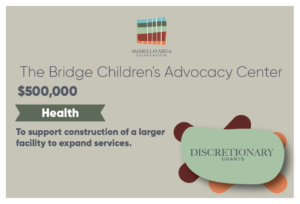
As the Bridge Children’s Advocacy Center has outgrown its current location for the types of services offered and number of clients seen, the new building for The Bridge will allow a single-stop location for more immediate and comprehensive services for clients. Children referred to The Bridge can be welcomed in a safe environment, served by forensic interviewers, receive a physical exam, and connect to immediate counseling services for themselves and family members. The Bridge is the only service provider working for the 26 counties of the Texas Panhandle serving children of sexual abuse and has over 70 contracts (MOUs) with affiliated partners within the panhandle for this scope of work. Moreover, each semester, the Bridge’s new facility will allow for three student interns with trauma-informed counseling training to work alongside clinicians to gain real-life experience in this specialized field.

Turn Center has a proven record of accomplishment for serving children with special needs and their families. These families have additional stressors to manage as they seek assistance for the learning, occupational or behavioral challenges their children face. Studies show that when controlling stress through counseling intervention, self-compassion plays a significant role in predicting posttraumatic “growth” in parents of children dealing with medical complexities. With outside funders such as AAF, Turn Center can reduce or waive counseling fees above what families can afford. Turn Center’s wrap-around services offering reduced rates for counseling help alleviate the extra burden these families carry. With a current counseling waitlist of 34 children, translating to a wait time of about 3-4 months, AAF’s financial support of the counseling services will allow more clients to receive treatment in a timelier manner.

The AAF grant award would allow UWAC’s 2-1-1 team to fund and train a Reentry Peer Specialist to handle the extremely specific demographic of justice-involved mental health clients. This project is a community wide collaboration and would allow this point person to gather valuable data, collaborate with community resource partners, and make strides towards reducing recidivism for those managing their mental health challenges.
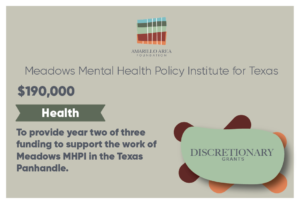
MI-P has continued their support of the community mental health system in partnership with Texas Panhandle Centers (TPC) and other systems partners, providing technical assistance supporting their Substance Abuse and Mental Health Services Administration (SAMSHA) Certified Community Behavioral Health Clinic (CCBHC) grants. An exciting area of focus is the creation of the diversion center at TPC’s newest location in the medical center which helps divert people from unnecessarily using regional emergency rooms and jails and instead provides them with best practice care. In 2024, MI-P helped providers submit three grants to expand and enhance our behavioral healthcare. All three were awarded, bringing over $11 million in new funds to our community. MI-P has undertaken a robust analysis of Texas Panhandle data to develop programmatic strategy, resource identification, potential policy focus areas, and exciting innovation opportunities. MI-P will share the finalized data analysis findings in January 2025.


The Amarillo Museum of Art showcases a variety of art, from regional creators to traveling exhibitions. These collections are available to the public at no charge and provide educational opportunities for locals. During the winter, the cold air from outside will mingle with the newly updated cooling system inside the building. AMOA predicts that this interaction will cause what had been an inconvenience with the entry doors freezing to become a safety hazard.
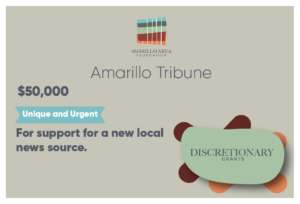
The Amarillo Tribune is a new nonprofit news outlet serving Amarillo and Canyon residents. It relies on private donations and advertising revenue to fund its operations. Currently, it is fully staffed, so the AAF grant funding will provide support for a Development Officer, which will increase its future sustainability.
